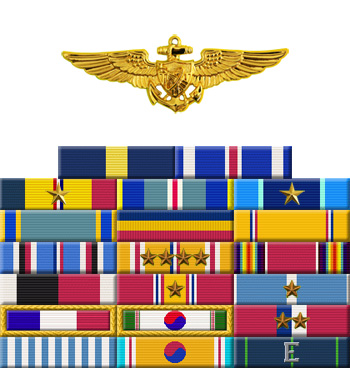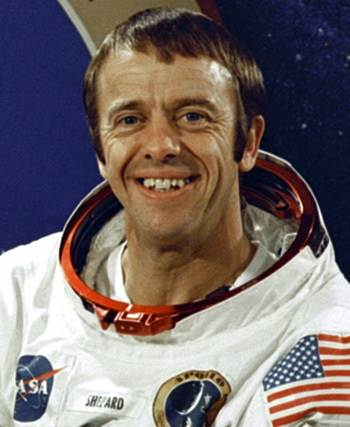
|
Alan B. Shepard, Jr. |
 |
|||
| Rank, Service | ||||
Rear Admiral O-8, U.S. Navy |
||||
| Veteran of: | ||||
|
||||
| Tribute: | ||||
Alan Shepard was born on November 18, 1923, in East Derry, New Hampshire. He was commissioned an Ensign through the U.S. Naval Academy on June 7, 1944, graduating a year early due to World War II. His first assignment was aboard the destroyer USS Cogswell (DD-651) in the Pacific Theater during the final year of the war. After the war, Shepard attended pilot training and was designated a Naval Aviator in 1947. His next assignment was with VF-4B (later redesignated VF-42) at NAS Oceana, Virginia, before attending Test Pilot school at NAS Patuxent River, Maryland, in 1950. He served on two deployments aboard the USS Oriskany (CV-34) during the Korean War before returning to flight testing at NAS Patuxent River, where he served until 1956. Shepard next attended Naval War College at Newport, Rhode Island, and after graduating in 1957 he was assigned to the staff of the Commander-in-Chief of the Atlantic Fleet. He was one of the original Mercury astronauts selected by NASA in April 1959, and he became the first American in space aboard the Freedom 7 spacecraft on May 5, 1961. Shepard became the Chief of the Astronaut Office at NASA in 1963 and was training for the Gemini program when he was taken off flight status due to an inner ear problem. He was restored to flight status in May 1969 and was selected as commander of the Apollo 14 mission. He flew into space for the second and last time from January 31 to February 9, 1971, on the third lunar landing mission. Shepard was the 5th person to walk on the moon. He resumed his duties as Chief of the Astronaut Office in June 1971 and served in this position until his retirement from NASA and the U.S. Navy on August 1, 1974. He accumulated over 8,000 flying hours during his Navy career and 216 hours in space as a NASA Astronaut. Alan married the former Louise Brewer of Kennett Square, Pennsylvania, on March 3, 1945, and they were married until his death on July 21, 1998. Louise followed him in death 5 weeks later, and both of them were cremated and their ashes were scattered in the Pacific Ocean. Alan and Louise had three daughters-Laura, Juliana, and Alice. |
||||
|
||||

